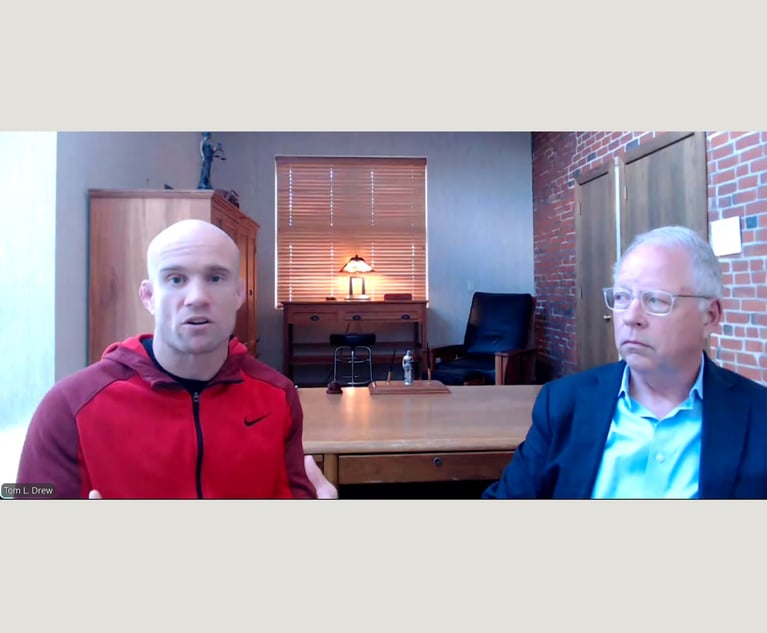 (l-r) Michele Johnson, Sarah Ray, and Mary Rose Alexander, with Latham & Watkins.
(l-r) Michele Johnson, Sarah Ray, and Mary Rose Alexander, with Latham & Watkins.Daily Dicta: Latham Leads With First-Chair Women Litigators
I spent yesterday evening—as I do every Wednesday evening—reviewing nominations for Litigator of the Week. The weekly contest is an inexact…
November 07, 2019 at 02:25 AM
6 minute read
I spent yesterday evening—as I do every Wednesday evening—reviewing nominations for Litigator of the Week.
The weekly contest is an inexact gauge, but taken as a whole, it underscores something persistent and depressing—that first-chair women litigators remain in short supply.
In 2016, we named 71 lawyers Litigators of the Week—but only 8 of them were women. In 2017, it was 12 women and 64 men. In 2018, 18 women and 50 men.
This year to date, it's 17 women and 55 men.
 Trust me, it's not because we're biased against selecting women litigators. Rather, it suggests that when it comes to the biggest cases, men are three times more likely than women get the lead roles.
Trust me, it's not because we're biased against selecting women litigators. Rather, it suggests that when it comes to the biggest cases, men are three times more likely than women get the lead roles.
Still. In 2019.
Which is why I'm so impressed with what's been happening at Latham & Watkins.
Since the beginning of the year, the firm has successfully tried five cases to verdict and been victorious in two fully litigated arbitrations. In six of the seven matters—each one a high-stakes, major commercial dispute—women served as lead or co-lead counsel. And not the same women—different ones first-chaired each case.
"We don't have two or three stars. It's a deep bench," said Michele Johnson, who is global chair of the firm's litigation and trial department.
Having a woman head the entire 750-lawyer practice group—which before Johnson was led by another woman, Jamie Wine—is one way Latham signals it's serious about giving women litigators the chance to shine.
The firm has "a real focus on promoting women and diverse attorneys, and our culture allows for that," said Mary Rose Alexander, who co-chairs the firm's environmental litigation practice. "Everyone has the ability to thrive."
Alexander notched a win in September, persuading a Colorado jury after a two-week trial to side with primarily with the defense in a product liability and warranty suit.
As a successful woman litigator, she said that the "key is to find your own voice, whatever that is and whoever you are, and not try to emulate someone else's style."
And at Latham, there are multiple role models.
"Tipping points are so important," agreed partner Sarah Ray. "At Latham, there are not one or two women leading trial teams, but women doing it over and over again."
Ray and an all-female team of associates scored a jury win in July in the Northern District of California for Oracle Corp..
NetSuite, which was acquired by Oracle in 2016, was sued for breach of contract and fraud by a Canadian firearms and outdoor outfitters online and retail company, represented by plaintiffs giant Stephen Susman of Susman Godfrey.
Ray took over the case in January of 2019, got key expert testimony excluded and convinced the jury (which deliberated for just over an hour) to deliver a complete defense verdict for Oracle.
That Oracle's entire trial team was women wasn't a deliberate, gender-based choice, Ray said. "It so happened that the right people were all women."
But she also acknowledged how essential it is to give more junior women litigators the opportunity to stand up in court and to "find their own style and message."
Latham partner Tara Elliott scored another trial court win this summer, when she co-led a trial team for Adobe Inc., which was hit with a patent infringement suit by TecSec Inc. in the Eastern District of Virginia
After adverse summary judgment rulings and facing potential liability of $150 million, Adobe brought in Elliott's team just months before trial.
Working with Mike Morin, Max Grant and counsel Rachel Weiner Cohen, Elliott—an IP litigator who got her start as a clerk at the U.S. Court of Appeals for the Federal Circuit—prevailed in a six-day jury trial.
The verdict: $1.75 million, or just over 1% of what TecSec sought. But not even those modest damages survived. Elliott and her team convinced the court to vacate the damages, granting their Rule 50(a) motions for judgment as a matter of law.
Another massive win came in August, when partner Jamie Wine racked up a $666 million arbitration award for DXC Technology in a fight with Hewlett Packard Enterprise Company, which was represented by Gibson, Dunn & Crutcher.
Working with partner Abid Qureshi, Wine led a two-week trial before a panel of neutrals over an accounting dispute stemming from the sale of HPE's former enterprise services business to DXC's predecessor company.
Latham's Lilia Vazova co-led another arbitration win, though details of the $50 million-plus fight are confidential.
And Johnson, who in addition to heading the firm's litigation department has her own full-time practice, came out on top in a federal jury trial in Orange County, California in February on behalf of Puma Biotechnology.
That the case—a securities class action—went to trial at all was a huge vote of confidence in Johnson, considering how seldom such cases are fully litigated and what was at stake. The plaintiffs represented by Robbins Geller Rudman & Dowd, claimed investor losses of $1.1 billion—a staggering sum, considering Puma's market cap was $1 billion. It was a literal bet-the-company case.
Johnson and her team, which included partners Colleen Smith and Sarah Tomkowiak, didn't win across the board, but the damages awarded by the jury are likely to total a mere $9 million to $18 million, depending on how many class members submit claims.
"We try to field the best teams matched to each client," Johnson said. That women played lead roles "wasn't in any way contrived for these cases."
Johnson added, "We are really, really focused on being a meritocracy."
This content has been archived. It is available through our partners, LexisNexis® and Bloomberg Law.
To view this content, please continue to their sites.
Not a Lexis Subscriber?
Subscribe Now
Not a Bloomberg Law Subscriber?
Subscribe Now
NOT FOR REPRINT
© 2024 ALM Global, LLC, All Rights Reserved. Request academic re-use from www.copyright.com. All other uses, submit a request to [email protected]. For more information visit Asset & Logo Licensing.
You Might Like
View All

Helping Lawyers Move Away from ‘Grinding’ and Toward a ‘Flow’

Why Litigation Demand Might Break Firms’ Boom-and-Bust Cycle
Trending Stories
- 1Friday Newspaper
- 2Judge Denies Sean Combs Third Bail Bid, Citing Community Safety
- 3Republican FTC Commissioner: 'The Time for Rulemaking by the Biden-Harris FTC Is Over'
- 4NY Appellate Panel Cites Student's Disciplinary History While Sending Negligence Claim Against School District to Trial
- 5A Meta DIG and Its Nvidia Implications
Who Got The Work
Michael G. Bongiorno, Andrew Scott Dulberg and Elizabeth E. Driscoll from Wilmer Cutler Pickering Hale and Dorr have stepped in to represent Symbotic Inc., an A.I.-enabled technology platform that focuses on increasing supply chain efficiency, and other defendants in a pending shareholder derivative lawsuit. The case, filed Oct. 2 in Massachusetts District Court by the Brown Law Firm on behalf of Stephen Austen, accuses certain officers and directors of misleading investors in regard to Symbotic's potential for margin growth by failing to disclose that the company was not equipped to timely deploy its systems or manage expenses through project delays. The case, assigned to U.S. District Judge Nathaniel M. Gorton, is 1:24-cv-12522, Austen v. Cohen et al.
Who Got The Work
Edmund Polubinski and Marie Killmond of Davis Polk & Wardwell have entered appearances for data platform software development company MongoDB and other defendants in a pending shareholder derivative lawsuit. The action, filed Oct. 7 in New York Southern District Court by the Brown Law Firm, accuses the company's directors and/or officers of falsely expressing confidence in the company’s restructuring of its sales incentive plan and downplaying the severity of decreases in its upfront commitments. The case is 1:24-cv-07594, Roy v. Ittycheria et al.
Who Got The Work
Amy O. Bruchs and Kurt F. Ellison of Michael Best & Friedrich have entered appearances for Epic Systems Corp. in a pending employment discrimination lawsuit. The suit was filed Sept. 7 in Wisconsin Western District Court by Levine Eisberner LLC and Siri & Glimstad on behalf of a project manager who claims that he was wrongfully terminated after applying for a religious exemption to the defendant's COVID-19 vaccine mandate. The case, assigned to U.S. Magistrate Judge Anita Marie Boor, is 3:24-cv-00630, Secker, Nathan v. Epic Systems Corporation.
Who Got The Work
David X. Sullivan, Thomas J. Finn and Gregory A. Hall from McCarter & English have entered appearances for Sunrun Installation Services in a pending civil rights lawsuit. The complaint was filed Sept. 4 in Connecticut District Court by attorney Robert M. Berke on behalf of former employee George Edward Steins, who was arrested and charged with employing an unregistered home improvement salesperson. The complaint alleges that had Sunrun informed the Connecticut Department of Consumer Protection that the plaintiff's employment had ended in 2017 and that he no longer held Sunrun's home improvement contractor license, he would not have been hit with charges, which were dismissed in May 2024. The case, assigned to U.S. District Judge Jeffrey A. Meyer, is 3:24-cv-01423, Steins v. Sunrun, Inc. et al.
Who Got The Work
Greenberg Traurig shareholder Joshua L. Raskin has entered an appearance for boohoo.com UK Ltd. in a pending patent infringement lawsuit. The suit, filed Sept. 3 in Texas Eastern District Court by Rozier Hardt McDonough on behalf of Alto Dynamics, asserts five patents related to an online shopping platform. The case, assigned to U.S. District Judge Rodney Gilstrap, is 2:24-cv-00719, Alto Dynamics, LLC v. boohoo.com UK Limited.
Featured Firms
Law Offices of Gary Martin Hays & Associates, P.C.
(470) 294-1674
Law Offices of Mark E. Salomone
(857) 444-6468
Smith & Hassler
(713) 739-1250







